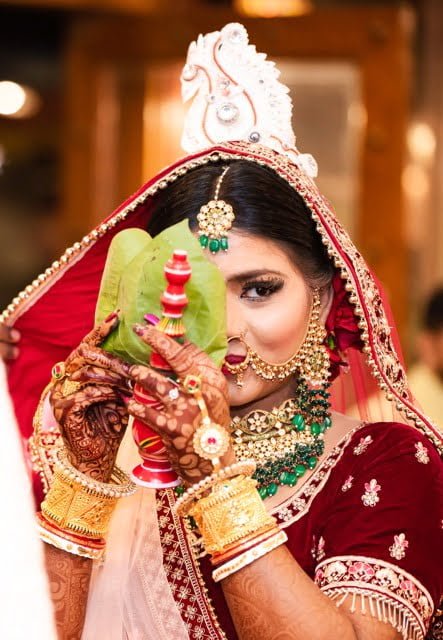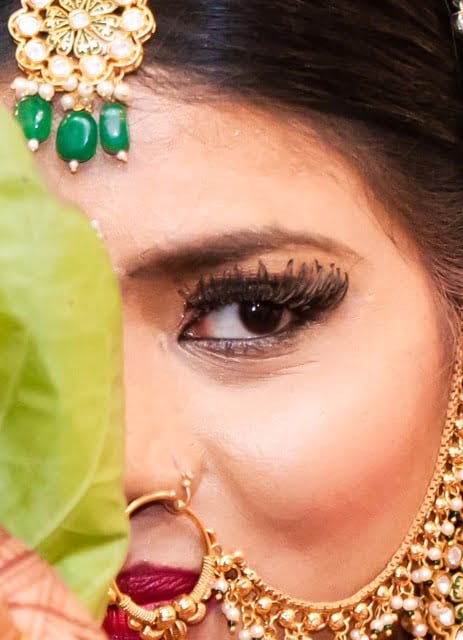Wedding Photographers in Lucknow | Random Clicks Photography
Capturing Happiness.
Best settings for great candid pictures in wedding
When it comes to capturing great candid pictures at weddings, there isn’t a one-size-fits-all setting. The ideal settings can vary depending on factors such as lighting conditions, the environment, and personal preferences. However, here are some general guidelines and best settings for great candid pictures in wedding that can help you achieve excellent results:


Using Aperture Priority mode allows you to control the depth of field, which is crucial for isolating your subjects and creating a pleasing background blur. Set a wide aperture (smaller f-number) such as f/2.8 or lower to achieve a shallow depth of field.
Candid moments often involve movement, and a fast shutter speed is essential for capturing them sharply. Aim for a minimum shutter speed of 1/250th of a second or faster to freeze action and minimise motion blur.
Adjust your ISO based on the lighting conditions. For outdoor daylight shots, keep the ISO low (around 100-400) to maintain image quality. In low-light situations, increase the ISO (e.g., 800-3200) to ensure proper exposure without excessive noise.
Candid moments can happen in a fraction of a second, and using burst mode (continuous shooting) allows you to capture multiple frames in quick succession. This increases your chances of capturing the perfect candid shot and offers options for selecting the best one later.
If you’re shooting in changing lighting conditions, using the Auto White Balance mode can be helpful to ensure accurate colour representation. Alternatively, you can set a Custom White Balance based on the prevailing lighting conditions to maintain consistent colour tones.
Choose a focus mode that suits the situation. For dynamic candid shots, continuous autofocus (AI Servo for Canon or AF-C for Nikon) is often preferred to track moving subjects. Alternatively, use single autofocus (One Shot for Canon or AF-S for Nikon) for stationary or posed candid moments.
If your camera offers a silent shooting mode, use it to minimise distractions and maintain the authenticity of candid moments. Especially during quiet or intimate moments clicking the right picture in silence is important to get perfect candid shot.
Remember, these settings are starting points. You may need to adjust them based on the specific lighting, environment, and desired creative effect. Regularly review your images on the camera’s LCD screen to ensure proper exposure and make any necessary adjustments. Practice and experimentation will help you find the perfect settings. Practice and experiment with your style and deliver outstanding candid wedding pictures.
Most photographers ignore and complain that pictures are not sharp because they neglect the “Reciprocal Rule for Shutter Speed.” When using a focal length of 200mm, you should set the shutter speed to the reciprocal of the focal length to minimise the risk of camera shake and achieve sharper images.
For instance, with a focal length of 200mm, the reciprocal rule suggests using a shutter speed of at least 1/200th of a second. This compensates for the increased magnification and potential camera movement associated with longer focal lengths.
However, it’s important to note that the reciprocal rule serves as a guideline. Various factors like the stability of your shooting position, the presence of image stabilisation systems, and the movement of your subject may necessitate adjustments to the shutter speed. If you are handholding the camera without image stabilisation, you may need to employ an even faster shutter speed, such as 1/250th or 1/320th of a second, to mitigate the risk of blur.
In conclusion, it is recommended to experiment with different shutter speeds. Evaluate the sharpness of your images in relation to the focal length and shooting conditions. This process will help you determine the optimal shutter speed for achieving sharp and blur free images.
Photography by Atul Ghosh & Vartika Jain